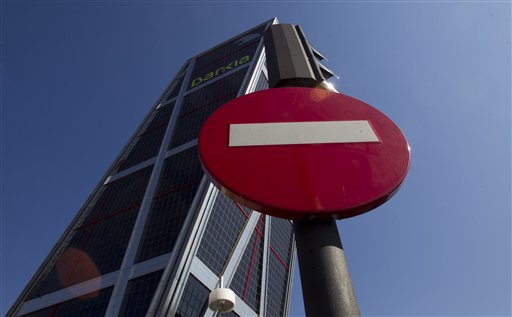DANIEL WOOLLS
Associated Press
MADRID
The European Union urged Spain on Thursday to come clean on how it plans to finance the overhaul of its banking sector, warning that uncertainty over this has contributed the recent market turmoil and the country’s soaring borrowing costs.
A European Commission spokesman, Amadeu Altafaj, told Spanish National Radio that the conservative government in Madrid needed to spell out quickly how it plans to finance the recapitalization of troubled lender Bankia SA and whether there are other banks burdened by toxic real estate assets that might need assistance.
The government nationalized Bankia earlier this month, and the (EURO)19 billion ($23.6 billion) in public money that will need to be injected is more than twice what the government had estimated.
Doubts over how recession-hit Spain will handle the bailout have sparked concerns that the country itself will soon follow Greece, Portugal and Ireland in asking for financial assistance. Spain’s borrowing costs on the international debt markets _ a sign of investor confidence in how well it can pay off its debt _ have hit worrying levels while its stock prices have been taking a pounding.
Spain’s deputy prime minister was headed to Washington to discuss the economic crisis with the U.S. Treasury Secretary Tim Geithner and Christine Lagarde, the head of the International Monetary Fund, which has been involved in all previous sovereign bailouts in Europe.
Altafaj said it would be best if the Spanish government turned to capital markets to finance the clean-up of Bankia, the country’s fourth largest bank, but stressed that if it is going to need external money it should say so soon.
Speaking in Brussels Thursday, European Central Bank head Mario Draghi criticized national regulators _ including Spain’s _ for choosing “the worst possible way” to help their banking sectors by delaying tough decisions.
Citing the example of Bankia’s current bailout, Draghi hit out at Spanish banking authorities for underestimating the extent of the nationalized lender’s problems and “then come out with a first assessment, a second, a third, fourth.”
Despite months of painful austerity reforms by the new government, there is growing concern that Spain’s new leaders have not done enough and more Spanish banks may need to be saved amid mountains of loans gone bad and foreclosures of property now worth far less than the loans paid out to build it. Some estimates put a complete Spanish sector bailout cost at between (EURO)50 billion and (EURO)150 billion. But Spain only has (EURO)5 billion left in the (EURO)19 billion bank bailout fund it established in 2009. This means the country will have to raise the money in bond markets.
Spain is a weak link in Europe not only because of its banks, but also because of poor economic growth prospects that show little sign of improvement. The economy is mired in its second recession in three years and forecast to shrink 1.7 percent for the year. Nearly one of every four Spaniards is unemployed and one-half of all those under 25.
The spending cuts and poor economic prospects have also prompted unrest, as in other European countries. Striking coal miners on Thursday became the latest group to march in Madrid, complaining that government funding cuts in the sector doom it to collapse. Several thousand miners demonstrated, and police baton-charged one group that was throwing stones and bottles. Police said two people were arrested and nine were slightly hurt.
Deputy PM Soraya Saenz de Santamaria travelled to Washington on Thursday as the borrowing costs _ or yields _ on Spanish bonds remained stuck at dangerously high levels. The 10-year bond was at 6.45 percent, down slightly from the previous day, according to financial data provider FactSet. Spain’s Ibex 35 stock index closed almost flat, with a 0.01 percent drop, ending a month of steep losses.
Meanwhile, Spanish Prime Minister Mariano Rajoy’s efforts to contain the crisis won praise from German Chancellor Angela Merkel, who noted the leader “has inherited a difficult situation.”
But in a further blow for Spain, Fitch ratings agency Thursday downgraded the creditworthiness of eight Spanish regions. Like the country’s banks, Spain’s autonomous regional governments are burdened by heavy debts.
Fitch said in a statement that the downgrades “reflect the negative economic and market environment in Spain, which has resulted in depressed fiscal revenues, and the structural fiscal deficits of the regional administrations, which will require considerable additional efforts to be reduced, and also the difficulties in accessing long-term funding.”
Also Thursday, Spain’s central bank released figures that show investor money is gushing out of the country: a record (EURO)66.2 billion in March alone, about double the figure for December, which was already a record. This flight stemmed from foreigners selling stocks and shedding Spanish state debt and private bonds, as well as Spanish banks and citizens depositing money in foreign banks.
The country’s trade deficit narrowed in March to (EURO)2.637 billion from (EURO)4 billion the same month last year, the central bank said. It attributed the change to 3.1 percent year-on-year increase in exports and a drop, by the same margin, in imports.
Economy Minister Luis de Guindos told Parliament an IMF report on the Spanish banking sector will be released June 11, and two independent auditors hired to assess Spanish banks’ loan portfolios and capital needs will complete their work in late July.
___
Jorge Sainz in Madrid, Barry Hatton in Lisbon and Juergen Baetz in Stralsund, Germany contributed to this report.

COMMENTS
Please let us know if you're having issues with commenting.